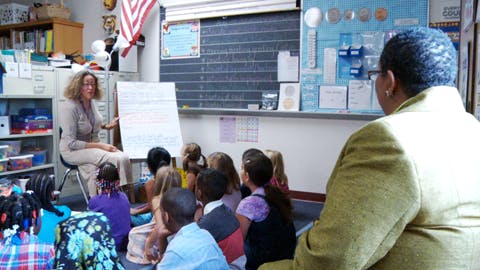Embattled Minneapolis public schools Superintendent Bernadeia Johnson abruptly resigned Tuesday, throwing into jeopardy several new high-profile initiatives in the state's most-scrutinized school district.
"Now is the appropriate time for me to step aside, not because I doubt our direction or our dedication," Johnson said in a statement. "I am acknowledging that the role of superintendent for this next phase of the work requires a level of intensity and focus to which I am unable to fully commit at this time."
Johnson's resignation comes midway through an already challenging school year. The district is facing one of the nation's largest achievement gaps, dramatically disproportionate suspension rates for students of color and a growing number of parents pulling their students from city schools. Johnson's departure comes less than a month after the school board gave her low marks for boosting student achievement and as she has faced mounting criticism from school advocates.
The board approved Johnson's resignation late Tuesday and named the district's chief executive, Michael Goar, as the interim superintendent. Johnson leaves Jan. 31 as the longest-serving superintendent in at least the past decade.
"Her leadership has brought clear vision for the path ahead and her team has established aggressive goals to move us toward that vision," Board Chairman Richard Mammen said in a statement. "This is a job bigger than any one individual, and the role of the superintendent to drive collaboration among all the school district's stakeholders is extraordinarily challenging. We are grateful for her service and we appreciate that she has built a strong leadership team to succeed her and manage the transition we now face."
Johnson, 55, was not available for comment and did not attend the board meeting. School officials said they did not ask for her resignation.
The superintendent's severance package entitles her to three months' salary, about $47,500, which is spread out through the end of June. Johnson will enter into a consulting contract for $12,000 a month to help with the transition, also until the end of June. She is entitled to a principal position in the district, under the agreement.
Johnson's four-year tenure puts her squarely among leaders of other urban school districts. The average big-city superintendent stays on about 3.6 years, according to a 2010 study by Council of the Great City Schools.
In November, the board said it was concerned with the district's leadership and about the "lack of academic progress, particularly among low-income students of color who are the majority of Minneapolis public schools."
In her statement, Johnson said she is not withering from the challenge, but accepting the reality that aging relatives would require more of her time and attention.
"It has been simultaneously the most challenging and the most rewarding experience of my professional life," she said. "My commitments to family, specifically assisting the needs of my elderly grandparents, are increasingly in competition with the extraordinary, yet rewarding, obligations required in this position."
Progress has been slow
Johnson has announced an array of new initiatives to focus resources on schools and close the achievement gap. Results, however, have been slow to come.
Last week, the district presented its academic progress report to the board. In the first two years of Johnson's leadership, the gap in math and reading test scores between students of color and white students began to close slightly.
But in the past two years, the gap has grown. Last school year the district saw the largest achievement gap since the 2009-10 school year. Black and American Indian students scored 57 percent lower on their reading exams compared with white students. In math, there was a 55 percent gap between black and white students.
Board members have grown increasingly skeptical of Johnson's leadership.
Outgoing board member Alberto Monserrate said recently that "there is going to have to be some accountability for the results we are getting."
Johnson's Acceleration 2020 academic plan, which was just starting this school year, was designed to tackle the achievement gap head on. Johnson was requiring each school to increase test scores by 5 percent overall, increase test scores for minority children by 8 percent and boost graduation rates by 10 percent each year.
That plan and others aimed at addressing disciplinary issues are now in jeopardy as a new board convenes in January.
Rep. Carlos Mariani, DFL-St. Paul and director of the Minnesota Minority Education Partnership, said Johnson always acted with a strong sense of urgency.
"Things have not quantitatively worked out," Mariani said. "In part, that tells me how big and difficult the situation is here and across the country."
In her four years with the district, Johnson had to contend with some high-profile setbacks.
She vowed to close North High School, one of the state's worst performing schools, and then changed her mind after community backlash. After a management study said she was spread too thin, Johnson hired a top deputy. But she had to change his title when the state informed her he wasn't licensed for the job.
There have been some successes, too. Earlier this school year, she announced a moratorium on suspensions of students in prekindergarten, kindergarten and first grade. That led to a 50 percent decline in suspensions compared with the 2013-14 school year.
In November, Johnson announced she was going to review all suspensions of students of color in an attempt to further reduce suspensions. Johnson received backlash from some, including a member of the U.S. Civil Rights Commission, who said she was discriminating against white students.
Incoming Board Member Don Samuels said it is unfortunate that Johnson will not be able to see through some of her boldest initiatives.
"It's now up to the representatives on the board to see that the next superintendent delivers," Samuels said.
Lynn Nordgren, president of the Minneapolis Federation of Teachers, said the union wishes Johnson well "in her future endeavors as well as in her family life, which we understand is a key issue in her decision to leave." Nordgren also said she looks forward to "an inclusive dialogue" with Goar.
Goar has been Johnson's second-in-command since June 2013. He grew up in Minneapolis and graduated from Washburn High School. Goar served as the chief operating officer of Memphis City Schools and the chief operating officer of Boston Public Schools.
Goar pledged to continue Johnson's work tackling the district's biggest problems.
"Significant challenges remain in front of us, but I am confident we can succeed," Goar said in a statement.
Alejandra Matos • 612-673-4028
8 months in jail for Blaine man who caused 120-mph crash hours after he was caught speeding

Daughter sues St. Paul, two officers in Yia Xiong's killing


